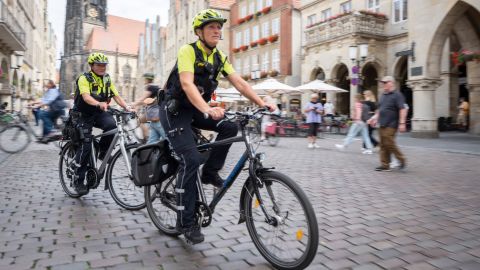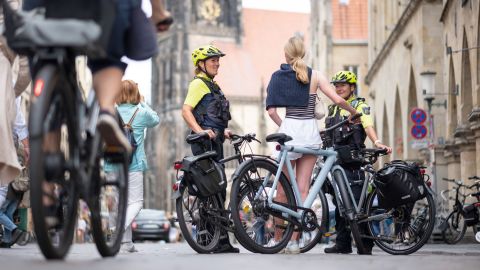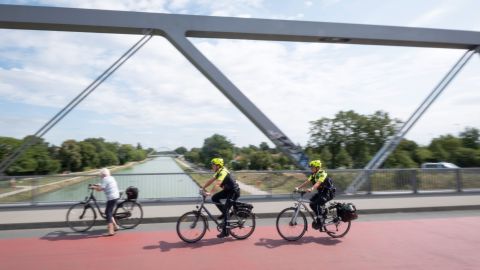No one knows that cycling is very communicative as well as Miriam Jablonski. The police superintendent has just got on her bike outside her station on Hammer Straße in Münster to set off in the direction of Prinzipalmarkt. That's 3.3 kilometers. A piece of cake, actually. If it weren't for the many people reacting to the policewoman in her cycling outfit. "Well, are you training? I'll join you!" a woman in her mid-forties calls out to her in a friendly manner. A casual remark here, a hello and recognition there. Miriam Jablonski keeps getting off her bike because people approach her directly: "I have a question ...!"
The 46-year-old has been cycling since her first year of service. A rarity back then, even in the cycling city of Münster. Jablonski now works as a bike patrol team leader and coordinates the operations of the eleven-strong bike squadron. From the day-to-day enforcement of road traffic violations to demonstrations and Preußen Münster home matches - the squadron, which was founded in 2007, is always on hand and often has an advantage over colleagues in patrol cars.
"We can also listen to the radio on our bikes and are often quicker on the scene, especially in the city center," says Miriam Jablonski. And: "People don't have such a big inhibition threshold when it comes to approaching us. We can act at eye level. Cyclists feel better understood by a policewoman on a bike."
Münster, the cycling city, needs to do something. The figures are clear: 57.5 percent of those involved in accidents in Münster are cyclists. In particular, the number of pedelec users involved has risen sharply. "The risk of becoming a victim of a traffic accident with personal injury is greater in Münster than in any other city," explains Chief Inspector Nicole Pollert, Head of the City VD.
As if under a magnifying glass, Münster is witnessing the traffic turnaround that has been initiated throughout the country. Bicycles, e-bikes, pedelecs, e-scooters everywhere you look. Dads and moms rocking their children through the city in overhanging cargo bikes on their way to daycare, shopping or friends.
Of course, in Münster with its more than 300,000 inhabitants, that might work, some people will argue. But even in Cologne, a city with over a million inhabitants, police officers have long since switched to bicycles. In a two-year project, they tested so-called S-Pedelecs, bikes that can reach speeds of up to 45 km/h. The results were clear. The results were clear. The battery-powered bikes offer the police an "excellent opportunity to 'swim along' in traffic", says Jens Liebenau from the Cologne police's bicycle squadron.
Liebenau is convinced that the future belongs to the bike squadrons. "Here in Cologne, many courier services have just switched to cargo bikes. The parcels are transported from trucks to central warehouses and transferred to bikes there. At some point, the city centers will be car-free," explains Liebenau.
Münster, no doubt, has a long tradition of cycling, a lot of experience and a big head start over other cities in terms of urban planning. 43.5 percent of journeys in Münster are made by bike, by "Leeze" - as bikes are called in Münster. But here, too, planning continues undaunted and new routes are being tried out in so-called real-world laboratories. Traffic lanes are being reduced in favor of cycle paths. Parking spaces and parking garages are being converted. The existing traffic space is to be redistributed and the city made more environmentally friendly. This does not always work smoothly; some plans have to be adapted to reality.
Bulletproof vest, helmet, cycling baggy trousers and gun in holster: Miriam Jablonski, the Münster police officer, is clearly recognizable on her bike, and not just because of the many reflective "police" signs. She and her colleague Monika Hilgenbrink are just passing Wolbecker Straße. For two years now, cyclists have been able to decide whether they want to ride on the road or on a cycle path alongside pedestrians. But most of them prefer the cycle path. They find the road too crowded and dangerous. Which in turn annoys some pedestrians.
"Hello! I have a question!" shouts a man on the sidewalk to Miriam Jablonski as she cycles past. And before she knows it, the chief inspector is in the middle of a discussion. Who is in the right if there is an accident here, where the cycle path and pedestrian path are so close together? What is the legal situation? It goes back and forth. The man knows his stuff. Miriam Jablonski responds to him in a friendly manner and explains the current legal situation.
The administration in Aachen is also working on the mobility transition. 30 percent of journeys in Aachen are already made on foot, 11 percent by bike. The city wants to achieve climate neutrality by 2030, among other things through convenient footpaths and cycle paths as well as attractive local public transport. "The citizens of Aachen are very proactive and politicians expect high standards when it comes to implementation. This change is not always easy," says Isabel Strehle, Head of Urban Development, Planning and Mobility Infrastructure at the City of Aachen.
But the aim is to improve the quality of life and quality of stay in Aachen. And the administration has received a lot of positive feedback, for example because neighborhoods have become quieter. "Every city has a different character and especially for those that were rebuilt after the war to be car-friendly, the traffic turnaround is a challenge. Merchants insist on the accessibility of city centers. However, this does not mean that you can park your car in front of the shop window. Retailers also need an attractive environment more than ever," explains Strehle.
Even in the less bike-friendly cities of the Ruhr region, a kind of vote with your feet is taking place. People there are also getting on their bikes more and more often and expect their local authorities to create more and safer routes for them. The tug-of-war for traffic space has begun.
"The traffic turnaround is happening so quickly. We as police simply have to keep at it," says Jens Liebenau from the Cologne bicycle squadron. For him, as for many other police officers, staying on the ball means switching to fast pedelecs. Münster police officer Monika Hilgenbrink sees it this way: "I recently followed a car driver talking on his cell phone into the underground car park on my bike. When I went to speak to him, I was gasping for breath. He grinned and said ironically: 'What, no e-bike?'"


